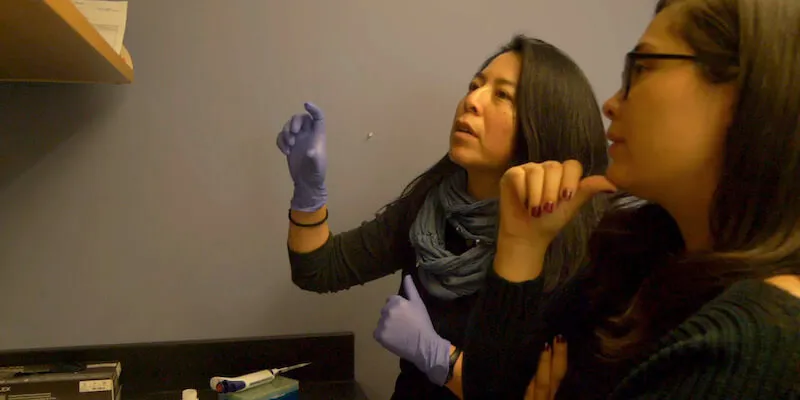Plant and soil science PhD student Erika Bueno, together with her advisor, associate professor Yolanda Chen, have been awarded a 2020 Gilliam Fellowship for Advanced Study by the Howard Hughes Medical Institute. The prestigious fellowship recognizes exceptional doctoral students who have the potential to be leaders in their fields and who are supported by a faculty mentor with a shared commitment to fostering diversity and inclusion in science.
“This is a very competitive program,” said Cynthia Forehand, dean of the UVM Graduate College, who nominated Bueno and Chen for the award. “Yolanda is a force in her field, successful mentor and has been a key player in increasing diversity at UVM, and Erika is an outstanding scientist. They seemed like the perfect duo.”
Bueno and Chen are the first UVM student-adviser pair to receive the award, which provides a three-year fellowship to Bueno and additional funding to Chen to support activities that address challenges to diversity and inclusion. Chen plans to use the fellowship funds to seed a new undergraduate scholar summer research program within the College of Agriculture and Life Sciences, which would provide fellowships for undergraduate students who contribute to increasing diversity in the life sciences.
“Several years ago, I had the honor of serving as a member of the study section that evaluates Gilliam Fellowship applications; the applications are excellent and the competition is fierce,” said Leslie Parise, dean of the College of Agriculture and Life Sciences. “It is an incredible accomplishment to be named a Gilliam Fellow.”
In the Chen lab, Bueno is studying the evolutionary genomics and stress response of agricultural insect pests, namely the Colorado potato beetle. Ever since she was a child, Bueno was fascinated by bugs. Her early infatuation with collecting insects eventually led her to pursue a bachelor’s degree in biology and master’s degree in ecology and evolution at San Francisco State University. As she progressed through her research, she became interested in the role of genetics in the evolutionary adaptation of insects.
Having begun her doctoral studies at the University of Miami, a fortuitous encounter with Chen piqued Bueno’s interest in agricultural pests and led to an opportunity to pursue her doctoral degree at UVM under Chen’s mentorship.
“With Yolanda, I feel I can talk to her about anything. The mentoring quality really sets the tone for a lot of things,” said Bueno. “She is very creative and I like that she pushes us to think outside the box to carve our own path as scientists.”
Having experienced the important role of mentorship first-hand, Bueno, a first-generation Peruvian American sought to create opportunities for other underrepresented students to share that experience. Working with a group of fellow graduate students, Bueno recently founded the first Vermont chapter of the Society for the Advancement of Chicanos/Hispanics and Native Americans in Science (SACNAS) based at UVM.
“My identity has often made me doubt whether I’m good enough for science. I’ve always had a sense of wondering whether I am here because of my identity, or because of my transcript and accomplishments,” said Bueno. “Part of SACNAS is to be able to open up these conversations because we know how hard it is to reflect on these issues and talk about them openly.”
Bueno says SACNAS aims to promote diversity, equity and inclusion, but also to create a sense of community among undergraduates, graduate students and faculty who are underrepresented in STEM. While the group has attracted several graduate students so far, Bueno is working to recruit and support more undergraduate students who are finding their path along their STEM career.
As part of the Gilliam Fellowship, both Chen and Bueno will have opportunities to strengthen their own mentoring skills. The fellowship includes funding to support professional development opportunities for Bueno and a year of training to optimize mentorship skills for Chen.
“For me, it’s a wonderful opportunity to engage with other faculty and form a community of people who are thinking on this front. Mentoring is one of the most important things we do, and yet faculty are not really trained to mentor,” said Chen. “Our country is experiencing so many tensions that come from a lack of understanding around racial and cultural divides. As mentors, we must know how to navigate these issues and support students with different experiences and backgrounds. I’m really excited to engage in this work and bring those lessons back to UVM.”
